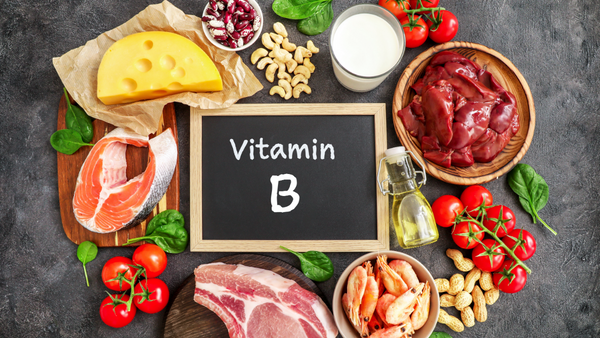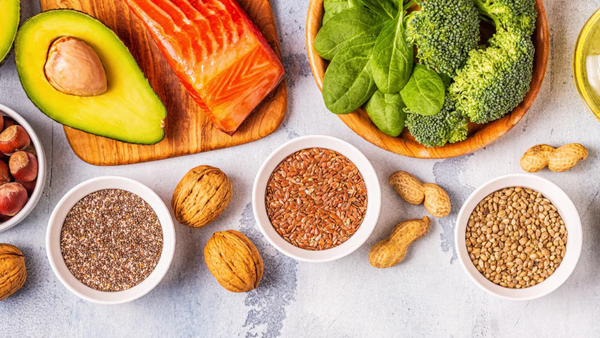B vitamins are among the essential nutrients that we must consume through food.
Why are B vitamins important?
B vitamins are a group of 8 water-soluble vitamins that serve as precursors for coenzymes. They are therefore involved in many metabolic processes . Although they are grouped together under the term "B vitamins", they are chemically very different and have different functions .
Most B vitamins are found in both animal and plant foods . However, vitamin B12 is only found in animal foods .
Below you will learn why the individual B vitamins are important, in which foods you can find them and how you can recognize a deficiency.
IT'S WORTH READING!
AT THE END OF THE ARTICLE YOU WILL FIND A VOUCHER FOR OUR VITAMIN B COMPLEX AND VITAMIN B 12!
Vitamin B1 (thiamine)
Vitamin B1 has important functions in energy metabolism and the nervous system.
Foods containing vitamin B1
The daily requirement is approximately 1 mg . [1]
Most nuts and seeds, such as sesame, sunflower seeds, pine nuts and macadamia nuts are very good sources of vitamin B1. But legumes , such as lentils and beans , and meat also contain a lot of vitamin B1. All of these foods contain around 1mg of vitamin B1 per 100g or more, so there is no risk of deficiency with a balanced diet. [2]

Vitamin B1 deficiency
A vitamin B1 deficiency occurs mainly in alcoholics and diabetics .
A deficiency manifests itself in loss of appetite and weight , memory problems and numbness in the hands and feet.
Vitamin B2 (riboflavin)
Vitamin B2 has essential functions in energy metabolism . It is also needed to convert other vitamins into their active form, which is available to the body. A vitamin B2 deficiency can therefore easily lead to an inadequate supply of other vitamins.
Foods containing vitamin B2
The daily requirement is around 1 mg . [3]
Liver contains several mg of vitamin B2 per 100g and most other offal is also rich in this vitamin. Almonds, cheese, meat, fish and eggs are also good sources of vitamin B2. [4]
Vitamin B2 deficiency
A balanced diet normally provides sufficient vitamin B2. A deficiency can occur if there are problems with absorption, such as in the case of alcoholism or irritable bowel syndrome . Hormonal disorders , such as an underactive thyroid , also promote a vitamin B2 deficiency.
A deficiency manifests itself in skin problems, chapped corners of the mouth and hair loss .

Vitamin B3 (niacin)
Niacin has important functions in fat metabolism . This vitamin is also needed for cell division and the immune system .
Foods containing vitamin B3
The daily requirement of vitamin B3 is approximately 15 mg .
Peanuts, liver and fish (especially tuna and anchovies) contain around 15 mg of vitamin B3 per 100g and are by far the best sources of vitamin B3. But meat, mushrooms (especially chanterelles) and whole grain products are also rich in this vitamin. [5]
Vitamin B3 deficiency
A deficiency in vitamin B3 is usually caused by diseases that impair absorption, such as irritable bowel syndrome .
It manifests itself through brownish discoloration of the skin when exposed to sunlight, headaches, fatigue and depression .
Vitamin B5 (pantothenic acid)
Vitamin B5 is essential for energy metabolism .
Foods containing vitamin B5
The daily requirement of vitamin B5 is approximately 6 mg .
The best sources of vitamin B5 are liver and sunflower seeds, with about 7 mg per 100 g. But mushrooms and fish also contain relatively high amounts of vitamin B5. [6]

Vitamin B5 deficiency
A deficiency of this vitamin is rare, but can occur in cases of malnutrition . It manifests itself in loss of appetite, restlessness, sleep disorders and headaches .
Vitamin B6
Vitamin B6 is involved in over 100 enzymatic reactions in energy metabolism . It is also required for the synthesis of hemoglobin , the protein that transports oxygen in the blood and gives red blood cells their color.
Foods containing vitamin B6
The daily requirement of vitamin B6 is approximately 1.5 mg .
Pistachios, sunflower seeds, fish and seafood, meat and brown rice are good sources of this vitamin. [7]
Vitamin B6 deficiency
People with an autoimmune disease, kidney failure or celiac disease (gluten intolerance) have an increased risk of vitamin B6 deficiency. Some medications can also impair absorption and increase the need for this vitamin.
A deficiency manifests itself in an increased susceptibility to infections, depression and anemia .

Vitamin B7 (biotin)
Biotin has important functions in energy metabolism and is important for the skin and hair .
Foods containing biotin
The daily requirement is 30-60 ug .
Peas, peanuts, eggs, oatmeal, liver, yeast and cocoa are particularly rich in biotin. [8]
Biotin deficiency
Certain congenital genetic defects can reduce the usability, thereby increasing the need for biotin and the risk of deficiency. Alcoholics and smokers are also two risk groups for biotin deficiency, as they have an increased need.
A deficiency can lead to fatigue, brittle nails and hair loss .
Vitamin B9 (folic acid)
Folic acid is needed for cell division . A sufficient supply is therefore particularly important during growth phases (during pregnancy and in children ).
Foods containing folic acid
The daily requirement is approximately 300 ug .
Legumes such as peas, chickpeas, lentils and beans, cabbage and green vegetables such as broccoli, cauliflower, Brussels sprouts, kale and spinach are good sources of folic acid. Bran and liver are also very rich in folic acid. [9]
Folic acid deficiency
An acute folic acid deficiency is rare. However, pregnant women have an increased need and are not always optimally supplied with folic acid. Therefore, pregnant women are recommended to take a folic acid supplement.
A deficiency manifests itself in headaches, heart palpitations and weakness .
Vitamin B12
Vitamin B12 has important functions in fat and protein metabolism . It is also essential for the functioning of the nervous system and for the formation of red blood cells .
Foods containing vitamin B12
Vitamin B12 is only found in animal foods . Fish, meat, eggs and dairy products are very good sources of vitamin B12. Liver is particularly rich in this vitamin. [10]

Vitamin B12 deficiency
The body stores large reserves of vitamin B12 that can last for several years. However, if you follow a strict vegan diet over a long period of time, the risk of vitamin B12 deficiency is still high. Vegetarians also have an increased risk because they tend to eat fewer animal products than omnivores.
A deficiency can lead to loss of appetite, fatigue, depression and memory problems . It is extremely dangerous because it can cause irreversible nerve damage.
Buy B vitamins
Many people are unable to meet their nutritional needs through food. To avoid having to take all B vitamins individually, Viktilabs offers a vitamin B complex that provides all 8 B vitamins . The capsules contain vitamins from quinoa sprout extract from controlled organic cultivation and are vegan.
Conclusion: B vitamins are found in many foods
B vitamins are essential nutrients and serve many different functions. B vitamins are found in many foods and, like other nutrients, should be obtained primarily through food. However, supplementation with a high-quality dietary supplement can help correct or prevent a deficiency .
AS PROMISED, YOU WILL RECEIVE A 10% VOUCHER ON OUR VITAMIN B COMPLEX , VITAMIN B COMPLEX FORTE AND VITAMIN B 12 .
SIMPLY COPY THE CODE VITAMINB+V10 AND ENTER IT AT CHECKOUT.
To the products
[1] https://www.dge.de/forschung/referenzwerte/thiamine/
[2] https://nutritiondata.self.com/foods-000108000000000000000.html
[3] https://www.dge.de/forschung/referenzwerte/riboflavin/
[4] https://nutritiondata.self.com/foods-000109000000000000000.html
[5] https://nutritiondata.self.com/foods-000110000000000000000.html
[6] https://nutritiondata.self.com/foods-000117000000000000000.html
[7] https://nutritiondata.self.com/foods-000111000000000000000.html
[8] http://www.vitalstoff-lexikon.de/Vitamin-B- Complex/Biotin /Lebensmittel.html
[9] https://nutritiondata.self.com/foods-000112000000000000000.html
[10] https://nutritiondata.self.com/foods-000116000000000000000-w.html

















